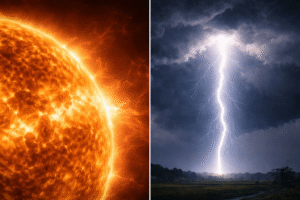Did you know? The term “Big Bang” — the most famous theory about the universe’s origin — was actually coined as a mockery, not as a scientific label!
In the fascinating world of physics, the names we give to cosmic mysteries can shape how we think about them, for better or worse. In this blog, Lost in Translation: How Physics Names Like ‘Dark Matter’ and ‘Big Bang’ Mislead Us, we dive into how a few badly chosen words have not only confused the public but may have also subtly steered generations of scientists down specific paths — sometimes the wrong ones.
Buckle up. Because once you realise how much names matter in science, you’ll never hear “dark matter,” “spin,” or “Big Bang” the same way again.
Why Naming Matters in Science
Science loves to categorise. From classifying galaxies to naming viruses, scientists build complex systems to make sense of the unknown.
But — and it’s a big but — names are not neutral. Names carry emotional weight, mental images, and hidden assumptions. When we label a mystery, we frame how we think about it — and sometimes, that framing can box us in.
Take everyday examples: Would you rather eat something called “Patagonian toothfish” or “Chilean sea bass”? Same fish, different appetite.
Now imagine that same phenomenon happening in the world of particle physics or cosmology, where the stakes are a little higher than your dinner menu.

“Dark Matter”: A Name That Locked a Mystery in Place
“Dark matter” sounds spooky and profound.
It evokes an image of some invisible, elusive stuff lurking in space, accounting for missing mass in galaxies. But here’s the truth: we don’t even know if it matters at all.
Some researchers argue that the mystery of galactic rotation could be explained by tweaking the laws of gravity, not inventing an entirely new form of matter. Yet because we call it “dark matter,” billions of dollars and countless hours of research are focused on finding a particle that may not even exist.
The Name Trap:
By calling it “matter,” scientists unintentionally nudged the entire research community down one narrow path, sidelining alternative theories like Modified Newtonian Dynamics (MOND).
Would we be closer to solving the mystery if it had been called “anomalous gravity behaviour” instead? It’s worth thinking about.
“Big Bang”: Not the Bang You Think
When you hear “Big Bang,” you probably imagine an enormous explosion in space — fireworks on a cosmic scale.
Except… that’s completely wrong.
The ‘Big Bang’ refers to the rapid expansion of space itself, rather than an explosion occurring within an already existing space. There was no centre. No fireball flying into an empty void. Space and time themselves were created in the expansion.
Yet, because of Fred Hoyle (who coined “Big Bang” as an insult during a BBC (British Broadcasting Corporation) interview in 1949), the mental image stuck — and now even science textbooks struggle to correct it.
The Name Trap:
The dramatic, explosive imagery of “Big Bang” makes people misunderstand the nature of the universe’s origin. Even worse, it’s hard to unlearn once the wrong mental image has been planted.
“Spin”: A Twisting Tale
In quantum mechanics, particles like electrons have a property called “spin.”
Sounds easy enough, right? Like a tiny ball spinning?
Wrong again.
Quantum spin is nothing like classical spinning. It’s an intrinsic property — like mass or charge — but it doesn’t involve literal rotation. Still, thanks to the word “spin,” generations of physics students first learned it incorrectly, creating confusion that can take years to untangle.
The Name Trap:
Trying to explain quantum behaviour using familiar, everyday words inevitably leads to misconceptions. Sometimes, familiar words are worse than technical jargon.
Words Shape Science
In all these cases, one theme repeats: names don’t just describe — they shape.
When physicists tried to name new phenomena using everyday language, they unintentionally framed those phenomena in ways that biased future research.
Imagine if, instead of calling them “quarks” (a term inspired by James Joyce’s nonsensical phrase “Three quarks for Muster Mark!”), Scientists had chosen something more serious, like “elementary mass units.” Would quantum chromodynamics — the study of quark interactions — have evolved differently?
In the podcast series What’s in a Name by Zeeya Merali (hosted by Nature magazine), physicists share how these naming accidents have impacted the course of discovery, sometimes nudging entire fields subtly off course.
Public Confusion: More Than Just a Language Problem
It’s not just physicists who suffer.
The public, too, absorbs these misleading terms. And when the public misunderstands science, it becomes harder to:
- Garner funding for basic research
- Build science literacy in schools
- Communicate scientific uncertainty honestly
- Encourage healthy scepticism without falling into cynicism
Misperceptions caused by terms like “Big Bang” and “dark matter” can fuel conspiracy theories and misunderstandings about what science actually says — and what it doesn’t.
Conclusion
Words matter — more than we think.
In the rush to describe the universe’s greatest mysteries, scientists have sometimes grabbed the wrong words off the shelf. And those words have shaped the paths of inquiry, research funding, education, and even public trust.
So next time you hear “dark matter” or “Big Bang,” take a second to remember: the label isn’t the thing.
And maybe, just maybe, if scientists are a little more careful — or creative — with their words, the next great scientific revolution could start with a better name.
Because in the end, naming the unknown isn’t just communication — it’s creation.
Author’s Note
Thank you for joining me on this thought-provoking journey into the hidden power of words in science. I believe understanding how language shapes discovery helps bridge the gap between scientists and society. If you enjoyed this article, I encourage you to share it and keep questioning — not just what we know, but how we talk about it.
G.C., Ecosociosphere contributor.




